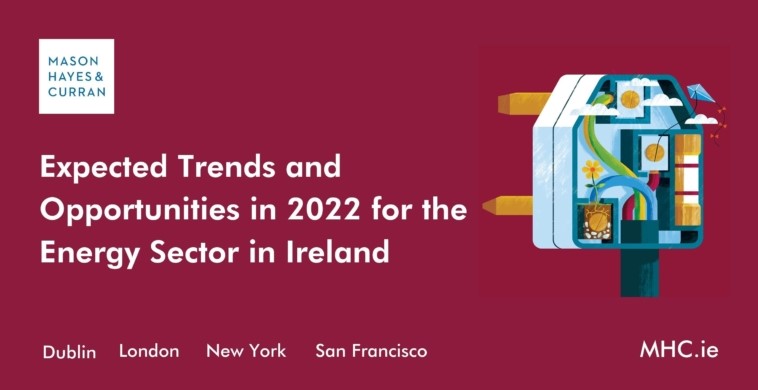Expected Trends and Opportunities in 2022 for the Energy Sector in Ireland

The overarching global trend remains the energy transition generally and counteracting climate change. This will see the continuation of the same business opportunities and threats that faced our clients in 2021 and plenty of policy and legislative changes for clients to grapple with. In particular Ireland’s climate action plan has a timetable of legislation, schemes, and policies to be adopted in 2022 in the Annex of Actions which can be found here.
The Climate Action Plan intentions for 2022 are numerous and wide in scope. However, of note they include the publication of a High-Level Roadmap on corporate PPA agreements, a consultation process on policy options and potential decision on “private wires” (behind-the-meter), policies on geothermal energy exploration, a climate finance roadmap and the commencement of a consultation on a 2030 electricity demand side strategy.
Key trends that will be a focus for clients in 2022 will include:
Auction processes
We will see further momentum with Ireland’s Renewable Electricity Support Scheme (RESS) auction programme. The provisional qualification date for the RESS 2 auction for on-shore wind and solar generators is 4 March 2022, with the auction process set to complete in May. The Department of the Environment, Climate and Communications’ indicative RESS timetable which was published before Christmas of 2021, anticipates the first off-shore ORESS auction to be run by Q4 2022 and for the on-shore RESS 3 auction to happen in Q2 2023 with an indicative auction volume twice that of RESS 2. In our RESS article, we focus in on key aspects of the RESS 2 auction terms and conditions, and the draft terms and conditions for the ORESS auction.
In relation to the ORESS auction process, the consultation on the draft terms and conditions only closed in December 2021 and remains under review. The ORESS auction process, as envisioned in the draft T&Cs, was dependent upon the enactment of the Maritime Area Planning Bill, which finally passed through all stages of the Oireachtas on 17 December 2021 and was signed into law by the President just before Christmas. The Climate Action Plan envisions that the necessary secondary legislation will be enacted within 4 months of enactment of the MAP Bill, and that the Marine Area Consent guidance process will be in place by Q2 2022. Further detail on the Maritime Area Planning Bill can be found here.
These auctions will take place against the backdrop of continued inflationary trends in the global supply chain, particularly for solar generation equipment. It is this inflation, together with the consequences of COVID-19 disruption, which has created concerns in relation to the commercial viability of a number of RESS 1 projects. It is likely that 2022 will provide a clearer picture of how many RESS 1 projects will actually be built out and whether corporate PPAs might provide a viable alternative route to market for these projects.
Grid Connection
It appears that a grid connection agreement will not be a pre-requisite for qualification for the ORESS auction. Participants will, however, need to have progressed to a “Grid Connection Assessment”, and the completion of the CRU’s off-shore grid connection policy is therefore going to be a critical milestone for the off-shore wind energy sector. We can expect the energy regulator’s decision on the off-shore grid connection policy for “phase one” projects in Q1 of 2022.
We will see plenty of developments in the grid connection policy framework over the course of 2022 as the system operators tackle the integration of even greater penetration of renewable generation on to the system. A few key processes to keep an eye out for in the first half of 2022 are:
- a vision and principles document from ESB and EirGrid on the future operating model for the grid
- a framework on the accommodation of multiple legal entities behind a single connection point, and
- an updated “over-installation” policy proposal.
These are likely to assist hybrid projects which are already anticipated in the RESS 2 terms and conditions and should help optimise generation sites. The long-awaited consultation process on policy options and potential decision on private wires is also likely to unlock additional development opportunities.
Security of supply
Security of our energy supply will present both challenges and opportunities for our clients. In Ireland, the phasing out of coal, peat and heavy fuel oil sources of power will continue to present opportunities for natural gas, interconnection to other jurisdictions, energy storage and renewable gas. Further policy and legislation can be expected to tackle the security of supply question during the course of 2022. The Government will face renewed pressure to accelerate policy decisions on these technologies, particularly in relation to green hydrogen, which are likely to play a significant role in Ireland meeting its net zero emission targets.
There will also be further developments targeting controlling the demand side. This is already an acknowledged issue for new data centre projects with the recent CRU decision in relation to connection measures now required for further data centre demand connections. See here our article on the data centre connection requirements for more information. Planning permissions for on-site conventional generation for data centres has been an issue faced by developers. However, the circular to planning authorities from the Department of Housing, Local Government and Heritage will hopefully help the consenting process.
Still, as further pressure comes on the electricity network and the Government takes steps to address required actions in the Climate Action Plan to align demand and usage to Ireland’s climate targets, it will be important for clients to monitor developments in this space over 2022.
Conclusion
Energy sector participants in Ireland will need to keep on top of the ever-evolving policy changes and market movements. The energy trilemma of security, access equity and sustainability have never been in such sharp focus as they are now. That will result in a dynamic sector from a legislative and public policy perspective with the added complexity of inflationary pressures. All of these factors, and the best way to handle and allocate the associated risks, will need to be considered when making project investment decisions and negotiating contracts.
For more information, contact a member of our Energy team.
The content of this article is provided for information purposes only and does not constitute legal or other advice.
Share this:




